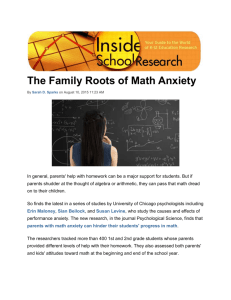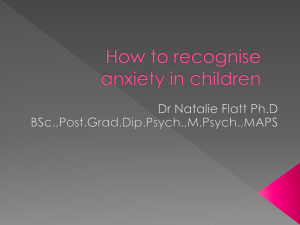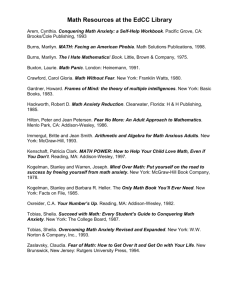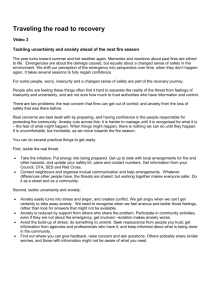File
advertisement
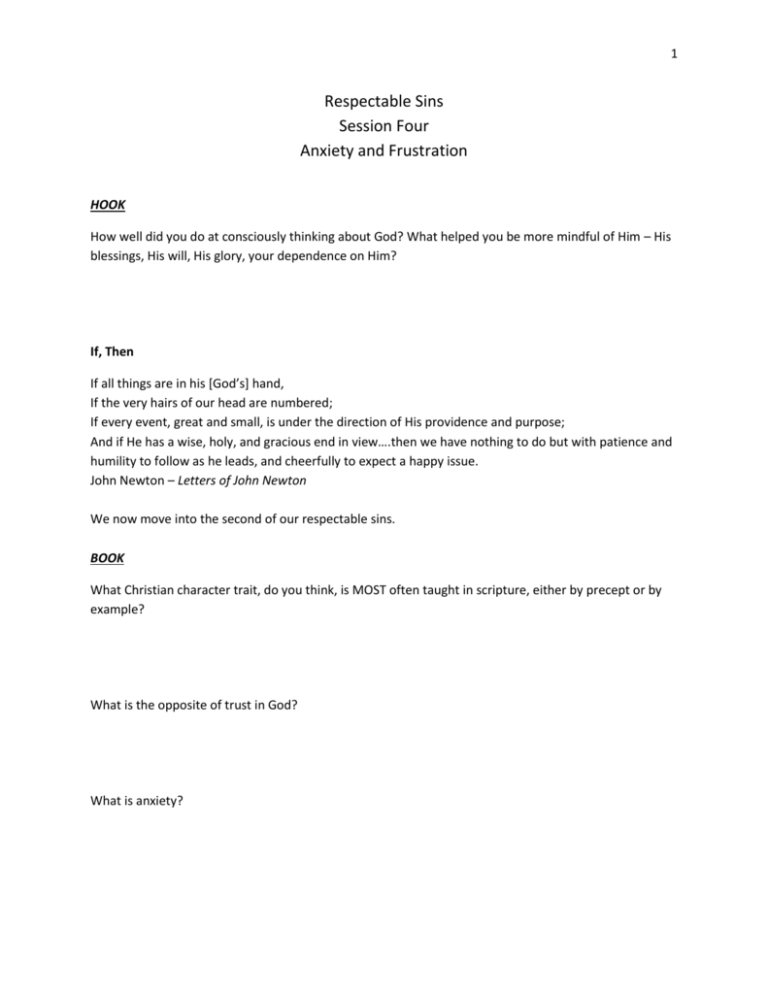
1 Respectable Sins Session Four Anxiety and Frustration HOOK How well did you do at consciously thinking about God? What helped you be more mindful of Him – His blessings, His will, His glory, your dependence on Him? If, Then If all things are in his [God’s] hand, If the very hairs of our head are numbered; If every event, great and small, is under the direction of His providence and purpose; And if He has a wise, holy, and gracious end in view….then we have nothing to do but with patience and humility to follow as he leads, and cheerfully to expect a happy issue. John Newton – Letters of John Newton We now move into the second of our respectable sins. BOOK What Christian character trait, do you think, is MOST often taught in scripture, either by precept or by example? What is the opposite of trust in God? What is anxiety? 2 What causes anxiety? What are some of the things we get anxious over? Read Matthew 6:25-34 What did Jesus teach, in Matthew 6:25-34, about how believers should respond to anxiety (worry)? Matthew 10:1-31, Luke 12:1-7 What do these verses teach us about worry, anxiety, fear? Philippians 4:6; 1 Peter 5:6-7 What do these passages communicate about worry and anxiety? Why is anxiety, worry, fear a sin? God Does Not Care? When I give way to anxiety, I am in effect, believing that God does not care for me and that He will not take care of me in the particular circumstance that triggers my anxiety of the moment…Anxiety is a sin also because it is a lack of acceptance of God’s providence in our lives…[His] orchestrating all circumstances and events in His universe for His glory and the good of His people.” Jerry Bridges “Suppose someone you love were to say to you, “I don’t trust you. I don’t believe you love me and will care for me.” What an affront that would be to you! Yet that is what we are saying to God by our anxiety.” Jerry Bridges 3 What is providence? Why do we have a hard time accepting the providence of God in ALL circumstances? Is worry the same thing as anxiety? 1 Samuel 13 and 14 Problem: Solution: What happens when something takes place that derails our plans or which we did not expect nor plan for? What is frustration? 4 Jerry Bridges – “Frustration usually involves becoming upset or even angry at whatever or whoever blocks our plans or desires. We forget that God’s invisible hand is behind whatever triggers our frustration. As we’ll see, whenever we face frustration we can rely on key resources and probably need to learn to pay attention to certain things.” PSALM 139:16 Our frustration, which usually involves being upset at whatever or whoever blocks our plans or desires, has roots in ungodliness because we are living as if God is not involved in our circumstances. What comforting and encouraging insights can we gain from Psalm 139:16 (NIV): “All the days ordained for me were written in your [God’s] book before one of them came to be?” When we hit those moments of frustration, worry, fear, anxiety, etc, we need to ask… Is there something I need to __________? Is there some sin I need to __________of? Is there some __________or __________of God I can learn? Is there some __________of __________I can give? What do Matthew 26:36-39 and Philippians 4:6-7 reveal about our need to pray for relief and deliverance from whatever tempts us to be anxious? When our faith falters and our situations loom larger in our minds than God’s promises, how should we obey Jesus’ command in Matthew 6:34 and find hope in Luke 12:6? What insight does Mark 9:23-24 offer? Reading for September 28 from Desiring God's Daily Devotional app, which features the best of over 30 years of John Piper's teaching to your everyday life and satisfaction in Jesus. Download it for free in the app store. Do not be anxious about anything, but in everything by prayer and supplication with thanksgiving let your requests be made known to God. (Philippians 4:6) 5 When I am anxious about getting old, I battle unbelief with the promise, “Even to your old age, I shall be the same, and even to your graying years I shall bear you! I have done it, and I shall carry you; and I shall bear you, and I shall deliver you” (Isaiah 46:4). When I am anxious about dying, I battle unbelief with the promise that “not one of us lives for himself and not one of us dies for himself; for if we live, we live for the Lord, or if we die, we die for the Lord; therefore whether we live or die, we are the Lord’s. For to this end Christ died and lived again that He might be Lord both of the dead and of the living” (Romans 14:7–9). When I am anxious that I may make shipwreck of faith and fall away from God, I battle unbelief with the promises, “He who began a good work in you will perfect it until the day of Christ” (Philippians 1:6); and, “He is able to save forever those who draw near to God through Him, since He always lives to make intercession for them” (Hebrews 7:25). Let us make war, not with other people, but with our own unbelief. It is the root of anxiety, which, in turn, is the root of so many other sins. So let us turn on our windshield wipers and use the washer fluid, and keep our eyes fixed on the precious and very great promises of God. Take up the Bible, ask the Holy Spirit for help, lay the promises up in your heart, and fight the good fight—to live by faith in future grace. Future Grace, Multnomah Books (Colorado Springs, CO), pages 61–61 LOOK Why is anxiety so common in our culture – in our daily activities, in advertising, in news reports? How does the Bible’s teaching about anxiety contradict what modern culture teaches about it? Which other sins often crop up if we tolerate anxiety and frustration in our lives? Do you think God sometimes allows us to face difficult, unchanging circumstances for reasons we may never know? Feel free to share a situation in which you learned a key lesson because you accepted that situation as part of God’s plan for your life. 6 Discuss this quote from the author: “Suppose someone you love were to say to you, ‘I don’t trust you. I don’t believe you love me and will care for me.’ What an affront that would be to you! Yet, that is what we are saying to God by our anxiety.” Throughout Respectable Sins, Jerry encourages us to remember God’s attributes. If we believe and remember that God is infinitely wise, loving, and knows what is best for us, then how will we respond to circumstances that tempt us to be anxious and frustrated? On the other hand, if we think God is simply toying with us and wanting us to suffer, how will we respond to trials? TOOK What types of circumstances tempt you to become anxious and frustrated? When has God used your anxiety and frustration to each you something, help you grow in a particular area, or get your attention and make you more attentive? Which particular insights, quotations, or verses in this session especially connected with you? Why? This next week, carefully note which circumstances tempt you to be anxious or frustrated, and when temptation occurs, immediately ask God to help you trust and obey Him. Write a prayer thanking God for being in control of your circumstances (even when you don’t feel that certainty). Invite Him to help you respond in ways that serve and glorify Him.


